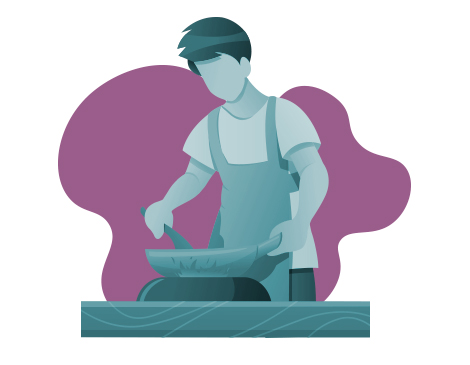For the first 10 months that I lived in Ohio, I spent most of my time in one of two places: the grocery store and the Cleveland Rape Crisis Center.
I spent a lot of time at the grocery store because my then-boyfriend worked at one. It had a cafe in the front and free Wi-Fi. I needed somewhere to work that wasn’t our new apartment, which was still full of boxes that needed unpacking, furniture to assemble, and other basic tasks that I couldn’t even get started on for the same reason that I spent all the rest of my time at the rape crisis center, recovering from debilitating trauma.
Once a week I sat in my therapist’s office and stared out the window as summer waxed and waned, and every other day of the week I sat with my laptop and tried (and often failed) to hit my deadlines, surrounded by office workers eating hot-bar lunches and food service workers whose existences they ignored. Then, as now, I did my best work via procrastination. In a grocery store, that meant food.
Most of my culinary expertise up to that point involved maximizing nutrition while minimizing effort: couscous, pasta, salad, eggs in every permutation. For the first time I found myself with both the time and motivation to cook in a more involved way, thanks to my freelance schedule and the new realization that I had little to gain from self-deprivation. Surely my body had already suffered enough.
For a long time, I had been wary of spending too much time on cooking because I was irrationally afraid of shoring up stereotypes that determined who should and shouldn’t work in the kitchen. Coming out as transgender had freed me from those expectations. When so many people, including in the White House, think that you should be denied basic human rights because of your gender, why waste time with any of their other opinions?
When your body is the site of political debate, something that other people view as a thought experiment or a curio rather than a living breathing person, caring for that body feels like an equally political act — a commitment to living with purposeful joy, rather than just surviving. Bread, as the women’s suffrage saying goes, but roses too. So I got better acquainted with our new kitchen.
Cooking is a practice like any other, something that grows in fits and starts. It began for me with the oven, and the realization that roasting is an almost foolproof route to edible food. If you can will yourself into the kitchen, then it isn’t too much more of an imposition to preheat an oven — and then you can roast a chicken; you can char green beans under the broiler; you can bake. When you’re a little more comfortable with cooking times and temperatures, you can switch pans in and out of the oven without feeling frantic and overwhelmed.
A meal is made of many moving parts; so is a life. As I got more comfortable with cast iron, with one-pan meals that went from the stovetop to the oven and back again, with slow-cooker stew becoming fall-off-the-bone tender, I also grew more comfortable with the way I moved through the world. I learned more about my own strengths and weaknesses — for example, I should never make biscuits.
I became less prone to blaming myself. Sometimes there’s nothing you can do to change the way something will turn out. Sometimes your bread just doesn’t rise. Sometimes it needs a little longer. Sandwich bread proves for an hour and a half, all told; brioche proves overnight. You can make pie crust two days ahead of time and leave it in the refrigerator until you need it — or in the freezer for up to three months.
These days my freezer is too full for pie dough. I see a new therapist via video chat, and I continue to pursue trans joy through every available avenue. My now-husband and I eat food we buy from the same people who grow it: raspberries so ripe and floral they fall apart when you pick them up, velvety green beans that barely need cooking, tomatoes so sweet they might as well be candy, eggs gathered the same morning.
Do you know what the best meal in the world is? If you can get out of bed, if you can uncurl your body from where it’s clenched like a fist, then you can turn the oven dial to 375 degrees. You can take the chicken you bought from the people who raised it, and rub it with seasoning — salt and pepper and rosemary is always good — and if you’re feeling fancy, you can stuff it with a head of garlic, or a lemon cut in half. Then all you have to do is put it in a pan or a Dutch oven, whatever you want as long as it’s deep enough to hold the juices, put it in the oven and wait.
There aren’t a lot of joys in life that are both genuine and prompt. Sometimes even one day feels like an eternity, and making it through feels like an impossibility, which is why roast chicken exists. If you can roast a chicken, you have dinner, and then several more meals. If you can roast a chicken, you can buy time. If you can roast a chicken, you can get off the floor, even when that feels like the most difficult thing in the world.
It may not be instant gratification, but what does that matter? In the scheme of things, in the great span of a lifetime, an hour isn’t so long to wait.




